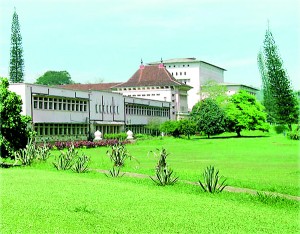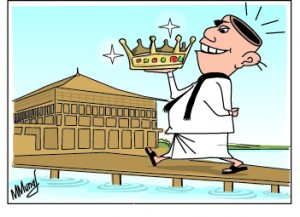Letters to the Editor
View(s):The collapse of academic autonomy in our Universities
I was emboldened to write some views on the above subject having read an illuminating account by Professor Savithri Gunasekera, with whom I worked together as academic colleagues and fellow Deans in the Open University of Sri Lanka during the eighties and the nineties. Having had the long experience of being an University academic in Sri Lanka continuously for over 43 years since graduation ( from 1966 until the age of mandatory retirement in 2009) and still being involved in academic administration, and teaching at the College of Chemical Sciences of the Institute of Chemistry Ceylon which is now producing nearly 50% of Sri Lanka’s Graduate

A university demands that its academic, administrative and accounting head should be at least a professor if not a senior professor.
Chemists, I think I can and should productively join in and add a few points in support of Professor Gunasekera’s presentation which should serve as an eye-opener to the political authorities, the academic community and the general public regarding the exponential erosion of academic autonomy and invaluable ethical standards in our University system.
I will pinpoint three relevant matters which I am sure would amply illustrate and add flavour to Professor Gunasekera’s arguments regarding the appointment of Vice-Chancellors.
First I refer to a newspaper editorial that appeared in November 2004 soon after the appointment of a Sri Lankan qualified academic as the President of the University of Alberta , Canada. I quote: “Dr Indira Samarasekera has been chosen as President of Alberta University on her own academic merit. But had she applied for a post of Vice.Chancellor in one of our Sri Lankan Universities, she would have needed one more qualification: she would have had to be either an SLFPer,UNPer or JVPer. Little wonder we remain in the same mire”. I have quoted this editorial extract in several academic presentations, school prize-giving speeches and in newspaper articles ever since, as I believe this quote summarises the absurd situation that existed in our University system even a decade ago.
At that time the UGC acted according to the Universities Act and made one recommendation to the President who correctly functioned merely as a formal appointing authority on an academic decision left entirely to the University Council and the UGC. Even at that time however the recommendation was politicised as implied in the above quoted editorial but the decision, even if politicised, was not made by the President but by academics. Today, as Prof Gunasekera laments, the Chairman, UGC states publicly that the UGC is merely a post box and admits thereby that it is contravening the Universities Act. What a sad, tragic situation and as quoted above “ little wonder we remain in the same mire”!
Second, when the post of VC was advertised in one of our Universities a few years ago and I heard that one of my colleagues, a senior professor and fully qualified was intending to apply I asked him whether it was so. He replied with a statement that should also open the eyes of all relevant persons if they are interested in at least maintaining the academic autonomy of our University system. I quote him: “ If anyone applies for a post of VC under the present conditions, then he is not fit to be a VC!” Prof Gunasekera emphasises the same point when she says that prospects of political decision-making has discouraged several senior professors from applying for the VC’s post at Colombo.
Is it not a tragedy that there was only one Professor who applied for this post at the Colombo University, a post first held by Sir Ivor Jennings of international repute and several other distinguished academics after him? There are hundreds of Professors in the several Universities here and while I will wholeheartedly agree that some of them may not be suitable for the post, surely a University demands that its academic, administrative and accounting head should be at least a professor if not a senior professor. How on earth can a Senior Lecturer Grade 2 fill that post with any degree of acceptance or self-respect? It is simply impossible and if any Senior Lecturer Grade 2 thinks that he can be a successful VC, then that itself proves beyond any doubt that he is not suitable! The authorities should ask themselves the question as to why senior academics are consistently not applying for posts of VC and when a few do, non consideration of their status and making the VC appointment on political grounds will psychologically prevent many suitable persons from applying in the future!
Third on a personal, but still relevant, note, after I retired after 43 years of continuous University service in three Sri Lankan Universities, I was asked by colleagues of my former Department of Chemistry at the Open University for a brief resume of my past academic history in order to forward my name to the Council with a recommendation for appointment as an Emeritus Professor. I was told that while the University academics are well aware of same, a formal writeup is necessary for the information of Council, consisting of a majority of outsiders. In my five point history, the very first point I mentioned was that “ I had never applied for a post of VC during my entire academic life in the University system”. That was considered by me as one of my greatest achievements particularly since I had to turn down consistent appeals from a number of academics and professionals including former Vice-Chancellors, who wanted me to apply. This statement of mine though of a personal nature, illustrates one of the important points that Prof. Gunasekera highlights in her account. Perhaps the point I made was recognised as an important one since I was subsequently appointed an Emeritus Professor.
I have said publicly on several occasions over the past two decades that politicisation is eating into the academic structure and fabric of our University system like a cancer and I made several appeals that this tendency and drift be reversed. Unfortunately, rather than a reversal it has been increasingly consolidated in recent years that the cancer has become malignant and spread to all areas of the system. No wonder then that the UGC Chairman states with great publicity and perhaps pride that the UGC is effectively going to act against the very clear provisions of the Universities Act and is not going to make a recommendation to the President. I can only say, “Sri Lanka- a land like no other! Little wonder we remain in the same mire!”
Professor J. N. Oleap Fernando
Emeritus Professor of Chemistry
Honorary Rector, College of Chemical Sciences, Institute of
Chemistry Ceylon
Via email
Stop marginalised youth from leaving our shores
Illegal migration of unskilled youth and their family members especially to Italy and Australia has been on the increase in recent years. The victims are the very poor, destitute, mainly school dropouts.
The two main groups of frustrated marginalized youth are those affected by the war and those from the fishing community.
To remedy this situation school principals should concentrate more on the weaker students. When they leave school too they should be given the necessary information on how to develop their talents, strengths and skills.
They should be encouraged and directed to join vocational institutes or centres.
It is heartening to hear that the government hopes to create 20 technical colleges for school dropouts, and upgrade five private vocational centres as Technical Colleges.
Ivor Hapuarachchi
Not much has changed in a thousand years!
The following poem was written by the Chinese Poet Su Tunq P’o almost a thousand years ago (1036 – 1101 CE)
On the Birth of my Son
Families, when a child is born,
Want it to be intelligent,
I, through intelligence,
Having wrecked my whole life,
Only hope the baby will prove ignorant and stupid,
Then he will crown a tranquil life,
By becoming a Cabinet Minister.
It appears that the qualifications required to be a Cabinet Minister remain unchanged even after a lapse of thousand years. Don’t you agree?
J. Madarasinghe
Galle
Follow @timesonlinelk
comments powered by Disqus



















